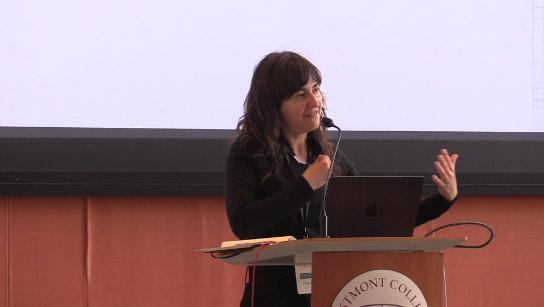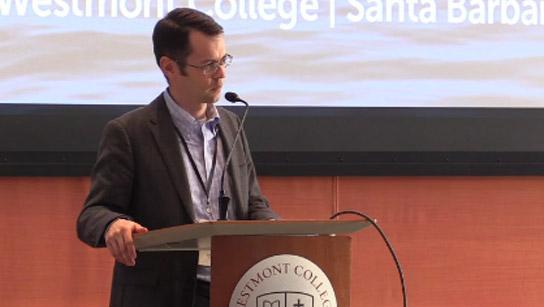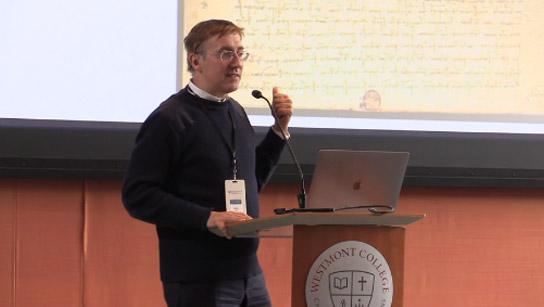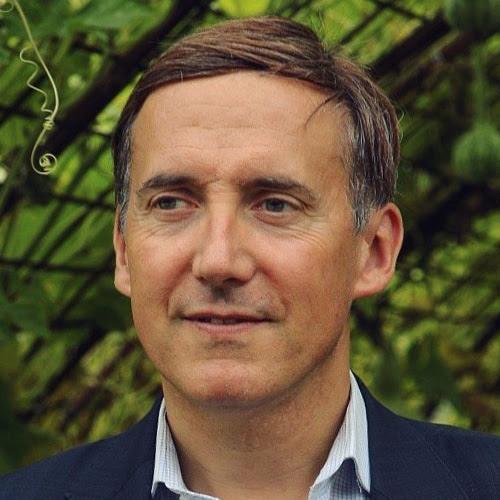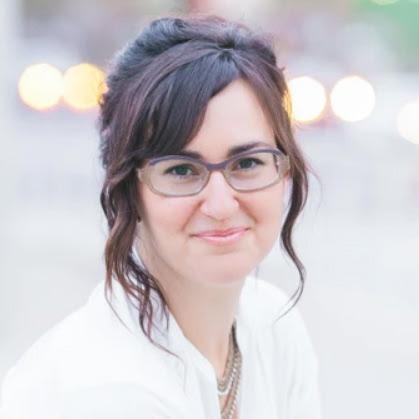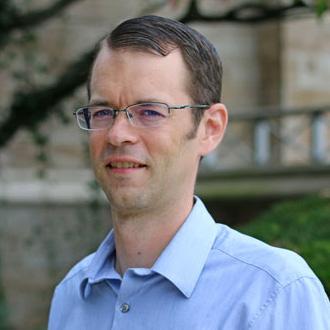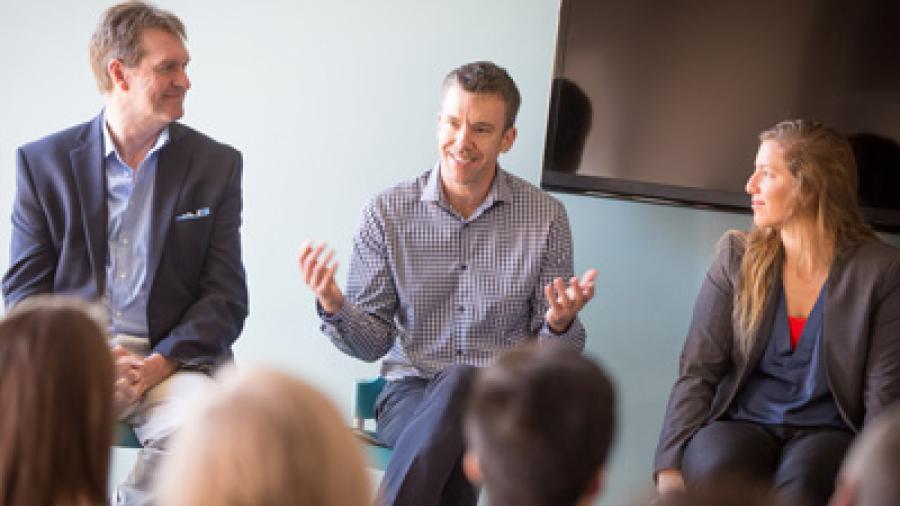| “Education in the Apocalypse: Teaching and Learning in Times of Uncertainty“ Athena Aktipis, University of Arizona |
|
| “Liberated to Serve the Common Good (But Not Necessarily the GDP)” Jeffrey Bilbro, Grove City College |
|
|
Closing Plenary Address |
As students imagine their futures, they are keenly aware that they will inherit a world that is changing rapidly and dramatically. Already the physical effects of global climate change—especially fires, droughts, floods, and freezes—are threatening established patterns of life. And the social effects of those changes might prove more disruptive still, as climate-related migration, political turmoil, economic instability, infrastructural collapse, and other developments threaten to upend the future that our colleges and universities are preparing students for.
These realities should inform how we teach and learn. They should provoke action in the natural sciences, but also in our habits of moral reasoning. They should spur us to technological innovation, but also to new modes of psychological and sociological self-understanding. They should produce more sustainable industries, but also more trenchant histories, economic theories, political philosophies, and works of art. Education for adaptability, for broad and deep empathy with other people, for genuine placement and embodiment—to name just a few possibilities—will be as crucial as we encounter the challenges entailed by the coming changes. In what ways does a liberal arts education equip people to engage these tasks or inhabit these values? How should liberal education itself adapt to these changes? What roles to teachers, students, and administrators have to play in discovering a livable future?
The twenty-first Conversation on the Liberal Arts will gather scholars, administrators, students, and practitioners to consider these questions and more. Specific themes might include:
- Psychological Resiliency: How students and educators can sustain a sense of meaning, direction, and hope in the midst of disruption;
- Vocational Adaptability: How colleges and universities can prepare students for a job market in rapid flux, and whether "vocation" and "work" should be significantly reframed;
- Curricular Strategy: How institutions can structure learning in ways that anticipate and account for uncertainty;
- Interdisciplinary Vision: How scholars and teachers can collaborate across specialties to address holistically the challenges of a changing world;
- Personal and Social Perspective: How age, race, gender, social location, or other facets of identity inform response to our climate future and its consequences;
- Moral and Spiritual Engagement: How ideas about the good life, or justice, or religious faith interact with the existential questions of our global moment.
Who should attend?
The Conversation on the Liberal Arts is designed to include a broad diversity of voices; our hope is that insight and change occur at the confluence of our various perspectives. We welcome attendees and contributors from different kinds of institutions (liberal arts colleges, research universities, religious and secular schools, nonprofit organizations, and more), different institutional roles (teachers, scholars, administrators, student life professionals, graduate or undergraduate students, practitioners in relevant non-educational fields, and others), and the broadest range of academic specialties and professional expertise. Anyone who has an interest in the value and practice of liberal education is warmly invited to join the conversation.
Submissions
We welcome individual papers or panel proposals; the deadline for submission is December 16, 2022.
|
Gaël Giraud is the founder of the Georgetown Environmental Justice Program at Georgetown University, a former energy policy advisor to the French government, a political theologian, and a Jesuit priest. A believer in multidisciplinary solutions to large-scale problems, he has been instrumental in the work of the Campus de la Transition, a cooperative laboratory that draws on the humanities, social sciences, and natural sciences to equip students, teachers, and professionals for the transformations that climate change is already bringing. |
|
|
Athena Aktipis is a psychologist at the University of Arizona who studies the possibilities and mechanisms for human cooperation in the midst of crisis. She co-directs the Cooperation Science Network and the Human Generosity Project, and is the author of the recent The Cheating Cell: How Evolution Helps Us Understand and Treat Cancer. She communicates her research in accessible and creative podcasts, writing, and gatherings (cf. the Zombie Apocalypse Medicine Meeting). |
|
| Jeffrey Bilbro is a scholar of English literature who specializes in environmental literature and theology. His recent published work includes Wendell Berry and Higher Education: Cultivating Virtues of Place and Reading the Times: A Literary and Theological Inquiry into the News. He is an editor at Front Porch Republic and contributor to The Liberating Arts, and serves as Associate Professor of English at Grove City College. |
"This conference has reminded me, after some time wandering in the proverbial desert, of why I got into academics in the first place."
—Conversation on the Liberal Arts participant
Format
The Conversation on the Liberal Arts is not a typical academic conference. We have great speakers, and we have much to learn from them. But all of us are engaged in this work everyday, so we also have much to learn from each other. To stimulate this mutual teaching and learning, we keep the conference small; we anticipate fewer than 100 participants. Plenary sessions include as much time for participants' questions and contributions as they do for the speakers' talks. Concurrent sessions are opportunities for discussion between presenters and attendees about key elements of the presenter's work. And there is ample time for informal conversation over meals and coffee—often the most fruitful moments of the conference. The crucial element throughout is conversation, where we can all benefit from each other's insights.
Participants
We also profit from a wide range of perspectives. This is a conference where administrators, scholars, students, and practitioners can talk to each other about how the issues look from their different positions, and where those from large universities and small liberal arts colleges, from public institutions and private, from faith-based institutions and those with no religious affiliation can explore shared challenges from our differing contexts. Attendees consistently remark on the distinctively personal tone of these three days, praising the diverse, face-to-face dialogue that often is missing at academic gatherings.
In short, the Conversation on the Liberal Arts is a hospitable place for dialogue across what are too often boundaries in higher education—dialogue about the shared challenges, and especially the shared promise, of liberal arts education. We hope you'll join us!
|
Regular Registration |
$300 |
| Student Discount for undergraduate and graduate students | -$100 |
The registration deadline for this event is January 31, 2023.
Below is the schedule of Conversation on the Liberal Arts. Titles of concurrent panels and paper manuscripts are linked to those documents. Please read the papers for the concurrent sessions you choose to attend ahead of the conference, and come prepared with your questions and comments. Papers will not be read during the session, in order to leave as much time as possible for conversation on the papers' central issues.
Thursday, March 2 |
|
|
2:45 pm |
Shuttle departs hotels for campus (drop off at Global Leadership Center) |
|
3:00 pm |
Registration | Global Leadership Center |
|
3:30 pm |
Welcome and Introduction | Global Leadership Center Plenary Address: “Education in the Apocalypse: Teaching and Learning in Times of Uncertainty“ | Global Leadership Center |
|
6:00 pm |
Dinner in groups at downtown restaurants (included in conference fee) |
Friday, March 3 |
|
|
8:10 am |
Shuttle departs hotels for campus (drop off at Global Leadership Center) |
|
8:30 am |
Breakfast | Global Leadership Center |
|
9:00 am |
Conversation Catalysts: “Learning in the Age of Climate Change” Table conversations prompted by student experiences | Global Leadership Center |
|
10:30 am |
Westmont Chapel Service: “Change, Resilience, and Obedience to God’s Call” Amanda Sparkman, Westmont College | Murchison Gymnasium |
|
11:30 am |
Concurrent Session 1 |
|
|
1a. Virtues and Skills for an Uncertain Future | Hieronymus Lounge (chair Christian Hoeckley)
|
|
|
(**Canceled**) 1b. Curricular Innovations for an Uncertain Future | GLC Classroom (chair Aaron Sizer)
|
|
|
1c. Pedagogies for an Uncertain Future | Alumni Gallery (chair Christen Foell)
|
|
12:45 pm |
Lunch | Magnolia Lawn (rain location Founders Dining Room) |
|
1:45 pm |
Concurrent Session 2 |
|
|
2a. Virtues and Skills for an Uncertain Future | Hieronymus Lounge (chair Lisa DeBoer)
|
|
|
2b. Curricular Innovations for an Uncertain Future | GLC Classroom (chair Christen Foell)
|
|
|
2c. Learning in and from the Natural World | Alumni Gallery (chair Christian Hoeckley)
|
|
3:00 pm |
Coffee Break | Global Leadership Center |
|
3:30 pm |
“Liberated to Serve the Common Good (But Not Necessarily the GDP)” | Global Leadership Center Jeffrey Bilbro, Grove City College (moderated by Aaron Sizer) |
|
5:15 pm |
Dinner | Founders Dining Room |
|
6:30 pm |
Poetry Reading: "Climatic Poetry" | Hieronymus Lounge Paul Willis, with cellist Rob Hodges (moderated by Cheri Larsen Hoeckley) |
Saturday, March 4 |
|
| 7:00am |
Trail Walk and Reflective Writing Exercise | Depart from Global Leadership Center Paul Willis, Westmont College |
|
8:10am |
Shuttles depart waterfront hotels for campus (drop off at Global Leadership Center) |
|
8:30 am |
Breakfast | Global Leadership Center |
|
9:00 am |
Concurrent Session 3 |
|
|
3a. Virtues and Skills for an Uncertain Future | Hieronymus Lounge (chair Lisa DeBoer)
|
|
|
3b. Curricular Innovations for an Uncertain Future | GLC Classroom (chair Marianne Robins)
|
|
|
3c. Learning in and from the Natural World | Alumni Gallery (chair Christian Hoeckley)
|
|
10:15 am |
Closing Plenary Address | Global Leadership Center Gaël Giraud, Georgetown University (moderated by Christian Hoeckley) |
|
12:15 pm |
Lunch (grab-and-go available) |
|
12:45 pm |
Shuttles return to waterfront hotels (pickup at Global Leadership Center) |
Participant Information
A Word About Format
As the title of our event suggests, these days are intended to be an extended conversation rather than a traditional academic conference, and participants will be coming from a wide variety of backgrounds and professional roles. With these considerations in mind, we recommend the following, especially as you prepare for concurrent panels.
- For All Participants
Please come to the panels having read and processed the authors’ work and prepared to engage in discussion with your colleagues. The full texts of concurrent papers are available on the conference website under “Conversation Schedule" (above). We encourage you to treat concurrent and plenary discussions as real conversations, in which all are welcome to initiate and respond, rather than as traditional Q&A sessions between “experts” and “audience.”
- For Concurrent Presenters
Plan to use no more than five minutes to summarize your paper, focusing on key ideas and areas for further discussion, and taking care to make your work accessible to a broad audience of non-specialists. As a part of these introductory remarks, we encourage you to pose some formal, well-considered questions for discussion among your colleagues. Paper handouts are welcome; AV equipment will not be provided except by special arrangement.
- For Moderators
We've allowed 60 minutes for each concurrent session. Please politely enforce five-minute limits for individual presentations, leaving the majority of the time for conversation. Beyond this recommendation, format is at your discretion. Feel free to manage the time and discussion leadership in a manner that suits the room and the material at hand. Do try, of course, to balance the conversation so as to give roughly equal time to each paper, and be prepared to seed discussion with your own questions or comments if conversation flags. Please make every effort to end on time, giving your colleagues ample chance for a break before the next session.
Flying
The Santa Barbara Airport is just 20 minutes from campus, and 15 minutes from waterfront hotels. Rental car and taxi services are conveniently located on site. Los Angeles International Airport is a 75-minute drive from Santa Barbara; from there, the Santa Barbara Airbus (about $60 one way) takes you to a mall complex in Santa Barbara, a short rideshare away from waterfront hotels. Amtrak is not cheaper or more convenient, as it requires a shuttle to and from LA Union Station. However, the train provides spectacular views of the LA basin and Pacific coastline.
Driving and Parking
Driving directions to campus may be found here. A map of campus may be found here. Parking at Westmont is free and no permit is necessary in any lot. The best parking options are the Kerr Student Center Parking Lot (P1 on map) or the Global Leadership Center Lot.
- Kerr Student Center Lot: This lot has plentiful space and will be most people's best option for parking. To get there, bypass the lower campus entrance, bear left at the fork in Cold Springs Rd., then left again to go through the large stone upper campus gate. Once you're through the gate, make an immediate left into a large parking lot (if you find yourself on a circular drive bordering a large lawn, you've gone slightly too far). From there, registration at the GLC is just to the south; from the lot, walk downhill on the path bordering Kerr Student Center, then bear left across the long footbridge. The GLC is the collection of golden-tan buildings just across the bridge.
- Global Leadership Center Lot: Enter through the lower campus gate (hard left turn off Cold Springs Road). Continue along the small campus circulator road to a T intersection with a sign pointing right to the GLC. The GLC is a collection of golden-tan buildings at the end of this spur road, and parking is available along the road.
Train
The Santa Barbara train station is at the lower end of downtown, a short taxi ride, or 20-minute walk, from East Beach hotels.
Campus Shuttle
Shuttle service will be provided between campus and the hotels listed below. Shuttles will run at the beginning and end of the program each day (see "Shuttle Information" tab for more).
Accommodations
If you wish to ride the shuttle to and from the conference, you'll find it most convenient to stay along Santa Barbara's East Beach between the Hilton and Ninos Drive (see the "Shuttle Information" tab for shuttle stop locations). You may wish to stay elsewhere, but please be aware that you will be responsible for arranging your own transportation to and from conference events. Shuttle-line hotels include:
- The Hilton Santa Barbara Beachfront Resort
- Santa Barbara Inn
- Mar Monte Hyatt
- The Inn at East Beach
- Cabrillo Inn at the Beach
- Pacific Crest Santa Barbara
- Motel Six
- others in the complex of hotels between Cabrillo Dr., Ninos Dr., Milpas St., and the 101 Freeway.
The shuttle will run between campus and select local hotels. City buses and local trolleys stop at these locations, too, so be sure to look for the Westmont shuttle. There are two shuttle stops: East Beach and Hilton, both on Cabrillo Boulevard (see below for precise locations).
Shuttle Stops
- The East Beach stop is just to the east of the Hyatt, and serves all waterfront lodging except the Hilton. From these hotels, most participants will walk to the beachfront boulevard (Cabrillo) and turn left. The stop is a bus turnout at the corner of Cabrillo and Ninos Dr. View in Google Maps
- The Hilton stop is just to the east of the Hilton Santa Barbara Beachfront Resort, and serves this hotel only. Exit the front of the Hilton, toward the beach. Turn left and walk along the waterfront until you see a large rainbow arch sculpture. The shuttle stop is directly in front of this sculpture on Cabrillo Boulevard. View in Google Maps
Preliminary Shuttle Schedule
Shuttles run once at the beginning and once at the end of each program day. We anticipate the schedule to be roughly as follows:
| Thursday | |
| Depart waterfront hotels for Westmont campus | 2:45pm |
| Friday |
|
|
Depart from East Beach Shuttle Stop Depart from Arches Shuttle Stop Depart from Montecito Inn |
8:10am 8:12am 8:20am |
| Depart campus for waterfront hotels | 7:40pm |
| Saturday | |
|
Depart from East Beach Shuttle Stop Depart from Arches Shuttle Stop Depart from Montecito Inn |
8:10am 8:12am 8:20am |
| Depart campus for waterfront hotels | 12:45pm |
(or click here for Westmont's comprehensive Interactive Campus Map)
